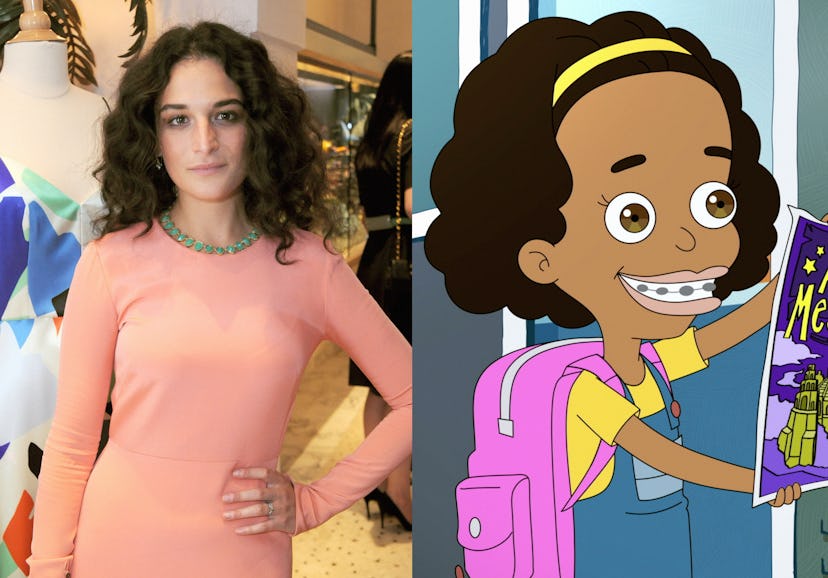White Voice Actors Resign From Playing Animated Characters of Color
Jenny Slate and Kristen Bell have stepped down from voicing Black characters in animated series like Big Mouth and Central Park.

In the weeks since the killing of George Floyd galvanized protestors against police brutality across the world, many industries have gone through their own reckonings with institutional and systemic racism. The entertainment industry is no exception, and those involved with the production of animated series have begun to take their turn in addressing the privileges and racism that afford some creatives opportunities to work and prevent others from having the same.
First, Jenny Slate stepped down from Netflix’s pubescent animated series Big Mouth as the voice of Missy, a half-Black, half-Jewish middle schooler. “At the start of the show, I reasoned with myself that it was permissible for me to play ‘Missy’ because her mom is Jewish and White—as am I. But ‘Missy’ is also Black, and Black characters on an animated show should be played by Black people,” Slate wrote in a statement released on Instagram. “I acknowledge how my original reasoning was flawed, that it existed as an example of white privilege and unjust allowances made within a system of societal white supremacy, and that in me playing ‘Missy,’ I was engaging in an act of erasure of Black people. Ending my portrayal of ‘Missy’ is one step in a life-long process of uncovering the racism in my actions.”
Shortly thereafter, series co-creator and voice actor Nick Kroll confirmed via Twitter that, “After thoughtful discussion with us and our Black collaborators, Jenny Slate has decided, and we wholeheartedly agree, that Missy on Big Mouth should be voiced by a Black actor” before apologizing for the decision to cast a white actor in the role in the first place. “We are proud of the representation that Missy has offered cerebral, sensitive women of color, and we plan to continue that representation and further grow Missy’s character as we recast a new Black actor to play her.”
As Slate announced she would no longer voice a biracial character on Big Mouth, another actor followed suit. Kristen Bell, who voices a mixed ace character named Molly on the Apple TV+ animated series Central Park, announced that she would no longer be playing that role. “Playing the character of Molly on Central Park shows a lack of awareness of my pervasive privilege,” she wrote. “Casting a mixed race character with a white actress undermines the specificity of the mixed race and Black American experience.”
Slate and Bell are not the first or only white actors to voice Black characters in popular American cartoons. There is a history of this sort of minstrelsy that dates back even further than the last century, but more recent examples of white actors voicing black characters include Mike Henry, who voices Cleveland Brown on Family Guy and Hank Azaria, who voices nearly every character of color on The Simpsons (and only recently decided he would no longer voice Apu, an Indian-American convenience store owner whose characterization has been critiqued as stereotypical and socially irresponsible).
But that’s not to say that creators should just avoid the topic of race altogether when it comes to fictional, animated characters, who don’t exist in the real world but do represent a fraction of real people from the real world. This week, Bojack Horseman creator Raphael Bob-Waksberg thoughtfully addressed his error in casting Alison Brie as Diane Nguyen, a Vietnamese-American character who travels to Vietnam in one episode to gain a deeper understanding of her heritage. “The intention behind the character is I wanted to write AWAY from stereotypes and create an Asian American character who wasn’t defined solely by her race,” Bob-Waksberg wrote. “But I went too far in the other direction. We are all defined SOMEWHAT by our race! Of course we are! It is part of us!”
A white actor voicing a Black cartoon character is a particularly vexing example of taking up space that Black people don’t always have access to in the first place. If we lived in a fair and just world, where everyone had equal opportunities for employment in any field, especially the animation voiceover sector, then any actor could voice any character. But the reality is that we don’t live in that world, and obstacles disproportionately keep people of color from having the same opportunities as white people and prevent them from being employed at the same rate. And when the specificities of the Black experience are written into the narrative as part of the character’s development, it’s unfair for that to be erased in the production process.
But perhaps what’s most galling about the current discourse surrounding race and animation happening is that it took until right now for this many people to have this sort of response to their privilege as white actors voicing animated characters of color. How many levels of executives did these decisions pass through before being green-lit and produced? We can applaud them for eventually making the appropriate decision, but it’s extremely telling that it took global protests against police brutality for some white actors to take a stance on whether it was right or wrong for them to voice characters of color on an animated series.
Related: Have Patience for the Owners of Black-Owned Bookstores